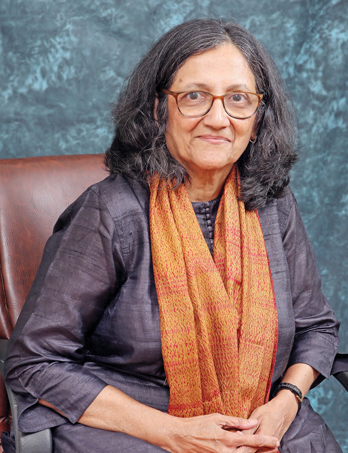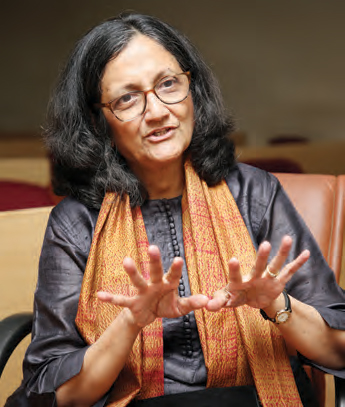Go Beyond the Obvious

Poised yet vibrant, her knowledge of the banking sector is phenomenal. After working in this sector for over two decades, she has set foot in the corporate sector, and makes sure that she applies her invaluable knowledge of banking to take this company forward. Meet Aruna Savant, who believes in taking measured risks. Currently, she is serving EbixCash Financial Technologies lending business as their Chief Management Officer. In conversation with Corporate Citizen magazine, Aruna talks about her glorious banking days, how she is incorporating her banking knowledge at EbixCash, spills the beans on her decision-making and market research approach, and a lot more.

Corporate Citizen: Can you begin by telling us a bit about yourself?
Aruna Savant: I was born in Pune, however, owing to my father’s profession, we kept moving to different cities. He was a banker, so love for banking, was in a way, in my genes. I did my schooling in Hyderabad, Visakhapatnam, and Bangalore. Finally we moved to Pune, where I completed high school from St Marys School. Later, I pursued my graduation in BSc from Fergusson College. As a child, I enjoyed travelling and living in different cities and making new friends. My husband is a chemical engineer from IIT Kanpur. He was a Technical Director with Serum Institute of India before he retired. To some extent, we are a family of bankers; our son is an investment banker with Morgan Stanley and our daughter-in-law works for Stripe, a payments company. I am not averse to taking risks, though not before I have weighed the pros and cons. Once I have the confidence, I take the plunge.
CC: So, your love for banking, did you get it from your father?
Surprisingly, I wanted to become a doctor. After I finished my Inter-Science, I was about to apply for the medical stream. My father told me to take a shot at appearing for the competitive banking exam-I landed a job, and then there was no looking back. Although my father introduced me to this field, I fell in love with it in no time. Soon, I started to enjoy my work and I was convinced that it was a great career to pursue. In short, it wasn’t planned but something that just happened. I took a chance and it worked, and looking back, I have no regrets.
Taking chances
Bank of India (BOI) was a great institution, but with a hierarchical structure typical to PSUs. Training and processes were given highest priority. What I learnt there from my seniors, laid the foundation for my career growth in the following years. Unfortunately, PSU Banks had a policy, where you had to do a stint in the rural area to be able to climb up the ladder. Somewhere along the way I felt stagnated, as it wasn’t possible for me to move away from home. That was the time, when my son was little, my husband was continuously travelling and my mother was bedridden. There was no way I could be away from my family. So I decided, that when the time is right, I would look for an opportunity in a private bank. So, after working for 20 years with Bank of India, I moved to Global Trust Bank. Luckily for me, that was the time when many private banks were coming into existence. These banks were more enterprising, customer centric and had a flat organisation structure. I thoroughly enjoyed working there. Unfortunately, the bank merged with Oriental Bank of Commerce which meant working in a PSU again. I was very sure I did not want to go down that path a second time. So I started looking for options. Again, my move to IT wasn’t planned. A friend of mine suggested that instead of limiting my search to banks, I should consider technology companies that were in the banking domain, where I could use the knowledge gained over the years. She referred me to the CEO of erstwhile Indus Software now EbixCash Financial Technologies, and before I knew it, I had an offer in hand.
"Go beyond the obvious. Try and learn the basics so that your foundation becomes rock solid. Technology should be used as tool, but knowledge of the subject must not be compromised. A client will trust you, only if he believes you are knowledgeable-machines can never replace the human mind, they can facilitate efficiency."
- Aruna Savant,
CC: What is the best piece of corporate advice you’ve received?
This piece of advice was given by my mentor and my manager from Bank of India, Ms Asha Dongre-she ingrained in me the importance of empathy in human relationships and that customer service was an attitude not just a department. She has been my mentor and guide, and the person who I have always admired and wanted to emulate. At the bank, I was fortunate to have the opportunity to work in departments like Foreign exchange, Retail and Corporate Credit, and other beats, and I put the advice to good use.
A genuine connection with your customer can take you a long way. It is important to think like your customer, to understand their problems. Working mechanically and applying rules may help to process papers but it will never help in building meaningful and priceless customer relationships. Back then, the customers would treat the banker as their friend and share their problems too. It’s not the same anymore. Today technology has taken over and no doubt it is the need of the hour, but somewhere, and sadly so, the human connect is missing.
CC: Your first job was for 20 years, what made you stick to one organisation for so long? Also, walk us through experiences and learnings.
Banking as a subject is an extensive canvas, and one can be constrained due to lack of opportunities to work in multiple areas. I was very fortunate in that respect. I worked in various departments and branches and there was something new to learn all the time. This kept me motivated to stay on with the organisation. The valuable knowledge and experience I gained transformed me into a well rounded professional, and most importantly a better human too. Apart from knowledge, I imbibed the right work ethics, and over time I realised how important those learnings were.
Just to give you an instance of how my BOI experience helped me - at the end of 1999, the world was hit with the fear of Y2K. The fear of data loss had gripped all banks. Private sector banks asked their employees to do manual entry of the data, for a few days. All my colleagues were at a complete loss of how to do it. Having worked in a fully automated environment, they just knew that the system does everything, but they did not know what happens behind every transaction. How the transaction reaches the balance sheet was a black box to them. But I had all the knowledge. I wasn’t fearful of it at all. I knew what exactly I was supposed to do. I was in the drivers seat and we sailed through this phase with confidence.
Even today when you go to the private banks and ask how interest is calculated, most of the front desk resources have no clue. We used to have something called an annual closing, and we did all calculations manually with the help of a simple calculator. We knew exactly how we arrived at a particular number. We could explain it to the customer. The basics were crystal clear.
CC: Some people are still hesitant to get their work done at the public sector banks. Do you see that changing soon?
There is no denying that efforts are being taken by PSUs to become customer centric, so that they can compete with their private sector counterparts. They are hiring a lot of youngsters from B-Schools and good Universities. It’s taking time, but I am sure things will change. Unfortunately retaining these youngsters is a challenge they need to overcome. Some PSUs have come up with specialised Personal Banking branches or boutique branches for VIP customers where they give personalised customer service, and it is doing wonders in terms of customer retention.
"A genuine connection with your customer can take you a long way. It is important to think like your customer, to understand their problems. Working mechanically and applying rules may help to process papers but it will never help in building meaningful and priceless customer relationships."
CC: Walk us through your current role with EbixCash Financial Technologies.
I am heading the EbixCash Financial Technologies’ lending business. I took over as their CMO two years back. Those were difficult times because Covid was at its peak. My earlier role was more domain-centric, but the new role involved a much larger and different kind of responsibility that included everything from administration, operational aspects, managing client relationships, project deliveries, growing revenue and being responsible for profitability. We have a large resource pool of 600+ employees. I encountered many challenges but we coped well, and the credit for that goes to the entire team.
CC: What are some of the best company policies that you’ve implemented?
When the pandemic struck, Covid took its toll across all industries and Ebix was no exception. Revenue dropped and many employee benefits like insurance, spot bonuses, happy hour celebrations and even annual increments were held back.The mood wasn’t good at all and motivation levels were low. I believe that for any company, its people are its biggest asset, more so in the technology business. My topmost agenda, was to restore these benefits as quickly as possible. Fortunately, I got excellent support from the management. The attitude and atmosphere across the company instantly changed for the better. Post pandemic, we introduced the hybrid 3/2 WFH model, which I think is working really well.
CC: A CMO reports directly to the CEO. Tell us about the times when there is a disagreement with the CEO, how do things function then?
Our group CEO is Mr Robin Raina, he operates out of Noida. I report directly to him. I must acknowledge, that he is very supportive. But, above all, he is a large-hearted person and a wonderful human being. As the Chairman and Group CEO, obviously, he has the right to ask questions, and when he asks questions, he gets me thinking. It’s not always about who is right. What is important is, he is willing to listen. There may be times when we agree to disagree or times when I have to give in. Eventually, we work things out, because finally we know whatever we do has to be in the interest of the organisation.
"The technology business has never been more dynamic-digital transformation is changing the way we do things. If we don’t focus on forward development of our products, they can become obsolete in no time. So, staying relevant is inevitable."

CC: What’s your decision-making style?
It’s a very inclusive style. I am not the kind who thinks ‘I know it all’. I have a very competent senior leadership team-people with rich experience and maturity. Important decisions are always made collectively after a lot of brain storming. The youngsters too come up with new ideas. They have complete freedom to express their thoughts, and often I have found their inputs are valuable. We huddle, debate, and then reach a consensus. This gives a sense of importance and belonging to the employees-the fact that their voice is heard, motivates them to do better.
CC: What is your approach, customer centric or competitor-focused?
I have been in the service industry all along where I learnt that ‘Customer is King’, but then you cannot afford to ignore competition. You have to balance both. Unless you understand what the customer wants you can’t push something that you feel is the best thing. Customer-centric is very important and it prevails. Customers will never buy a product that they don’t need, no matter how much you try to convince them. Having said that, competition cannot be ignored. I like competition because it keeps me alert and on my toes all the time.
CC: When not working, how do you like to spend your time?
I love to read. Reading helps me think and introspect. I recently read a book by Patrick M. Lencioni titled ‘The Five Temptations of a CEO’ It has been an eye-opener. It’s an old book on management. I generally don’t read books on management, because more or less they tell you the same thing, but this one is written like a novel. The best part about this book is its narrative approach, which actually holds out a mirror to you and you can easily relate to it.
CC: So, what’s next on your plate?
I want to take this company to the next level. Not just in terms of revenue but in terms of our product offerings. At heart, I’m a very product-centric person. The technology business has never been more dynamic-digital transformation is changing the way we do things. If we don’t focus on forward development of our products, they can become obsolete in no time. So, staying relevant is inevitable. In the wake of that, I hope to integrate Artificial Intelligence (AI), Machine Learning (ML), Microservices based architecture and native Cloud compatibility, in addition to functional enrichment. This requires investment in terms of money and talent. I can say we are moving in the right direction.
CC: Any advice for the students?
Banking is a great field to be in. Most of the time, I feel the youngsters have become slaves of technology, very mechanical in the way they think. I would advise them to go beyond the obvious. Try and learn the basics so that your foundation becomes rock solid. Technology should be used as tool, but knowledge of the subject must not be compromised. A client will trust you, only if he believes you are knowledgeable-machines can never replace the human mind, they can facilitate efficiency.